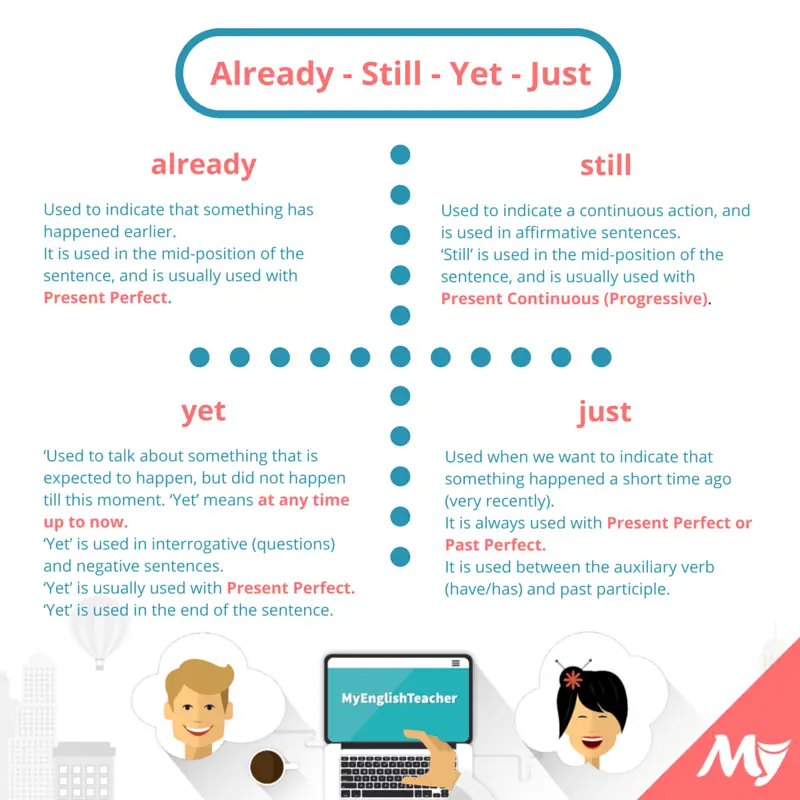
ALREADY, STILL, YET, JUST
1. ALREADY
‘Already’ is used to indicate that something has happened earlier.
It is used in the mid-position of the sentence, and is usually used with Present Perfect.
In American English, it is also possible to use ‘already’ with the Simple Past.
For example,
British English:
- I have already done my homework.
- He has already washed the car.
American English:
- I already did my homework.
- He already washed the car.
2. STILL
‘Still’ is used to indicate a continuous action, and is used in affirmative sentences. ‘
Still’ is used in the mid-position of the sentence, and is usually used with Present Continuous (Progressive).
For example,
- I am still doing my homework.
- He is still washing his car.
‘Still’ requires the use or Progressive forms, except for the verbs be, have and verbs of primary perception* or when you want to indicate a habitual situation (HABIT).
For example,
- I still have the book that you gave me.
- I am still a strong guy.
- I can still hear< him.
- I still see her outside.
- She still <goes jogging in the park. – HABIT
- He still shops at TARGET. – HABIT
NOTE: ‘still‘ is not often used in negative sentences. It is usually replaced by ‘not…anymore’ or ‘no longer’
For example,
- I no longer< have the book that you gave me.
- I am not a strong guy anymore.
* Verbs of primary perception: see, hear, taste, smell, listen, feel, watch.
Recommended for you:
What does OFF mean?
List of Sentence Connectors in English with Examples!
When to Use THIS and IT in English?
Difference Between VERY, TOO and ENOUGH!
3. YET
‘Yet’ is used to talk about something that is expected to happen, but did not happen till this moment. ‘Yet’ means at any time up to now.
‘Yet’ is used in interrogative (questions) and negative sentences.
‘Yet’ is usually used with Present Perfect. ‘Yet’ is used in the end of the sentence.
For example,
- Have you finished your homework yet? – Interrogative
- I haven’t washed my car yet. – Negative
‘Yet’ is very rarely used in affirmative sentences, but when it is used, it implies a negative.
For example,
- I have yet to read the ‘Harry Potter and the Goblet of Fire’ book = I have not read the ‘Harry Potter and the Goblet of Fire’ book yet, but I will probably read it soon.
4. JUST
‘Just’ is used when we want to indicate that something happened a short time ago (very recently).
It is always used with Present Perfect or Past Perfect.
It is used between the auxiliary verb (have/has) and past participle.
‘Just’ can be used in affirmative and interrogative sentences.
For example,
- I’ve just called my grandmother. (Present Perfect)
- Have you just called your grandmother? (Present Perfect)
- We had just< finished dinner. (Past Perfect)
NOTE: In American English ‘just’ can be used with Simple Past.
For example,
- I just saw him outside.
- I just called my grandmother.
Recommended for you:
How to use ‘just’? Can you explain the meaning of this …
What’s the difference between Present Perfect Simple and Present Perfect Continuous?
Other ways to say “just kidding”
Difference Between “Just” and “Only” [Infographic]


























